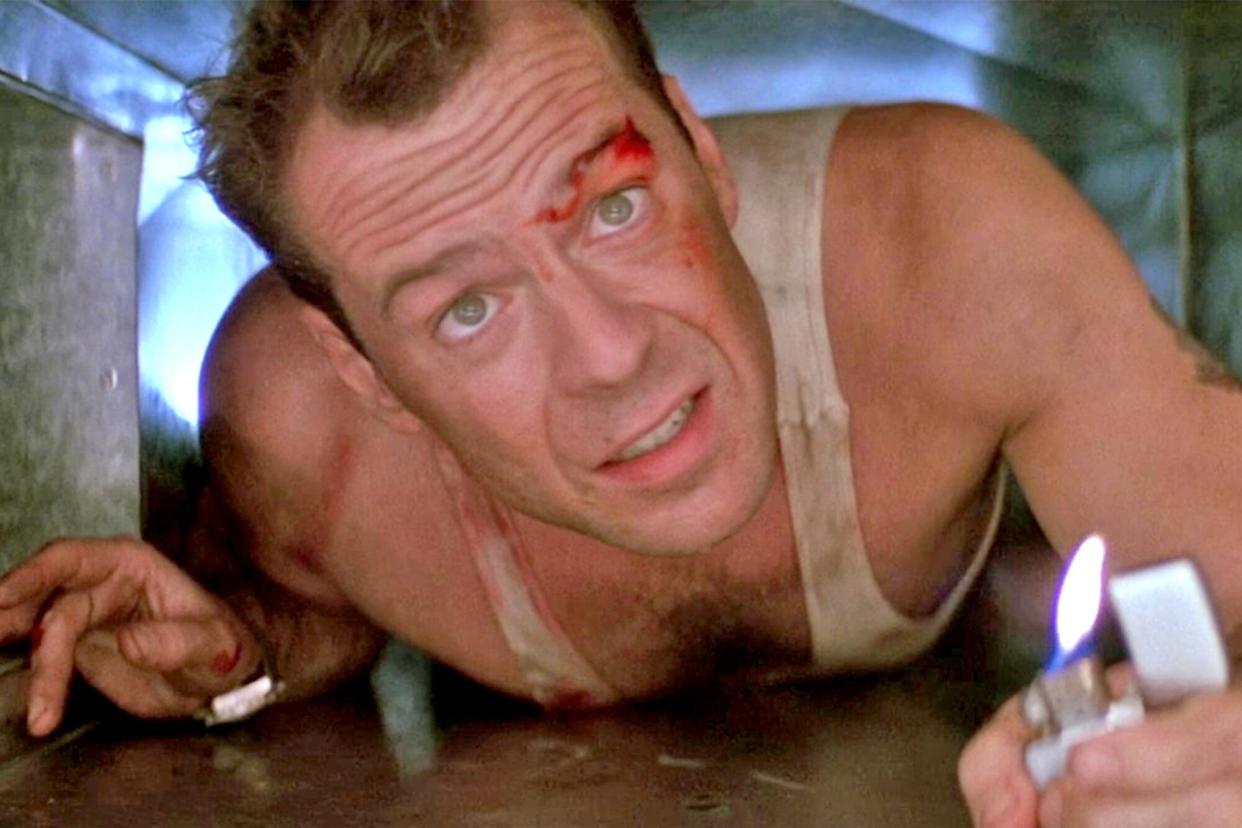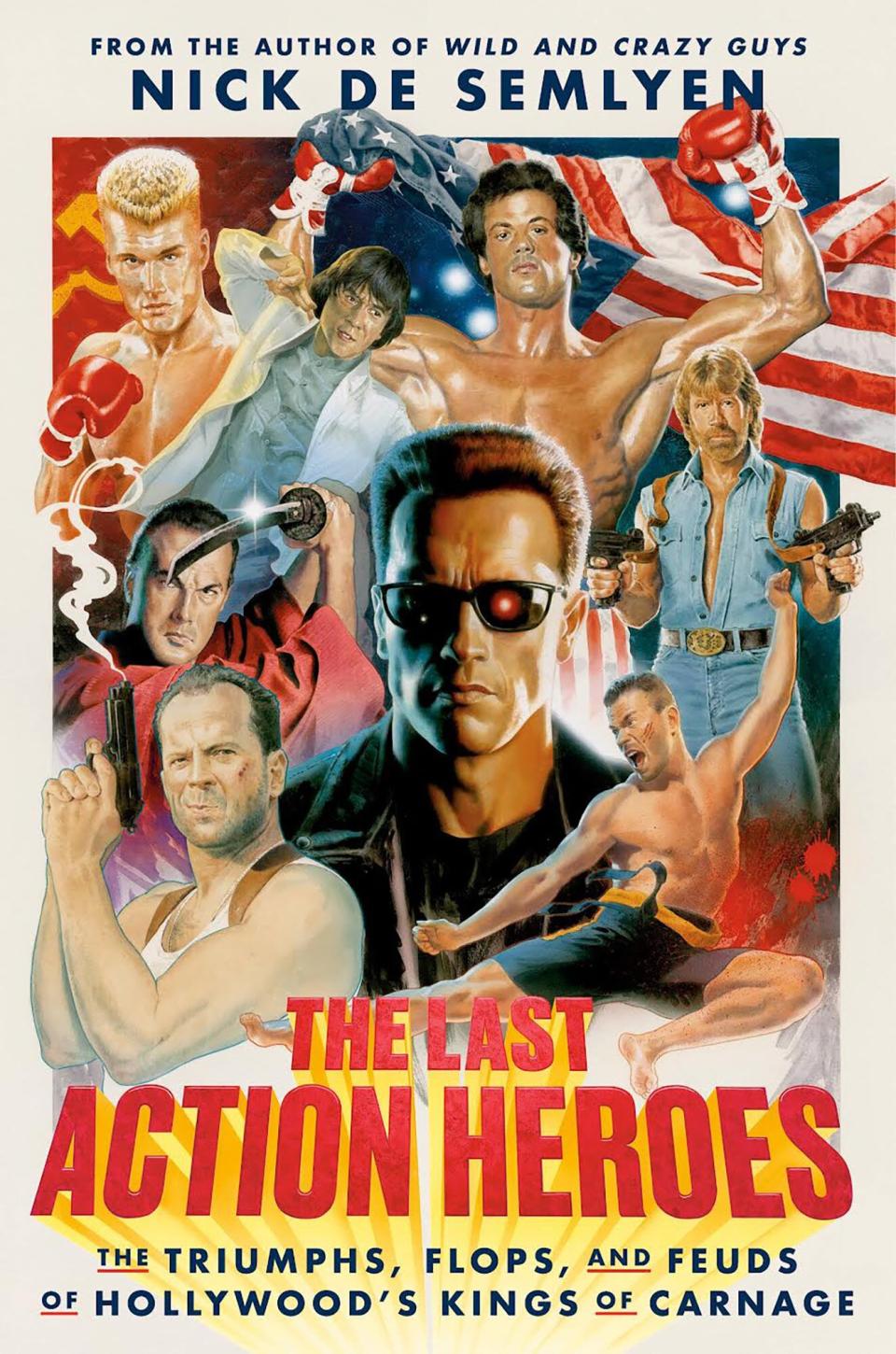Find out why Arnold Schwarzenegger 'guffawed' through Die Hard in this The Last Action Heroes book excerpt

- Oops!Something went wrong.Please try again later.
- Oops!Something went wrong.Please try again later.
- Oops!Something went wrong.Please try again later.
- Oops!Something went wrong.Please try again later.
- Oops!Something went wrong.Please try again later.
In his 2019 book Wild & Crazy Guys, Empire magazine editor Nick de Semlyen detailed the ups and downs of Bill Murray, Steve Martin, John Belushi, and other comedic legends of '80s Hollywood. Now, with The Last Action Heroes: The Triumphs, Flops, and Feuds of Hollywood's Kings of Carnage (out June 6), the author turns his gaze to the action titans of the same period.
De Semlyen charts Sylvester Stallone and Arnold Schwarzenegger's professional and personal feud against the backdrop of Reagan's America and the Cold War, then spotlights the untold stories of those who ascended in their wake: high-kickers Chuck Norris and Jackie Chan, glowering tough guys Dolph Lundgren and Steven Seagal, and quipping troublemakers Jean-Claude Van Damme and Bruce Willis.

Twentieth Century Fox Bruce Willis in 'Die Hard'
Speaking of Willis, few thought an action movie with a TV star in the lead — at the time, he was known primarily for ABC's Moonlighting — translated to box office gold. Famously, numerous A-listers, including Sylvester Stallone and Mel Gibson, turned down the lead in Die Hard before Willis was offered the role. In the exclusive excerpt below, learn how the film, directed by John McTiernan, written by Steven E. de Souza, and produced by Lawrence Gordon, became a bona fide blockbuster.

Crown Cover art for 'The Last Action Heroes: The Triumphs, Flops, and Feuds of Hollywood's Kings of Carnage'
Many inside 20th Century Fox felt that Die Hard was a folly: a trashy run-and-gun action flick with a TV star. Hollywood at large watched as it ran over budget and over schedule, whispering about how much it was going to cost not just Fox but the whole town; because of Willis's $5 million fee, every certified film star was hiking up their own asking price, too. And Fox's marketing department flew into a panic as the July 15 release date rushed up and the film's original poster proved deeply unpopular with the public. "They had a giant shot of Bruce and a little building, and it tested the lowest of any poster they'd ever tested," says producer Gordon. "So they rejiggered it so it's a big building and Bruce small." Not a good omen for the $5 million man. "The newspaper ads didn't even say his name," recalls screenwriter de Souza. "His fans had turned on him because of the feud he was having with his co-star on Moonlighting. And then at the same time somebody who worked for Bruce, scraping barnacles off his boat, drowned. There was just a lot of bad press. All over the country, when the trailer played, as it said 'Bruce Willis,' the audience would either laugh or boo."
Still, inside the core group finessing Die Hard into shape, there was a sense of quiet confidence. An internal screening, with an audience of just fifteen in a Fox screening room, propelled the viewers to the edge of their seats. "Everybody was stoked," de Souza says. "Even with 'Shot Missing' cards, even with a temporary score, even with Alan Rickman falling onto a blue airbag — you could see the bag below him — we knew it was lightning in a bottle." And the first sneak preview for the public, in Mountain View, California, got a standing ovation. "The helicopter landed on the pad," says Gordon of that night.
When it started to screen for critics, some were unimpressed. "Manipulative, cold, sexist, too long and often badly acted," opined one newspaper review. Roger Ebert, weirdly fixating on the portrayal of a deputy police chief, dubbed it "a mess." But far more hailed its surprising smarts ("The filmmakers even have the wit to play the 'Ode to Joy' when Hans finally walks into the opened vault," wrote Caryn James in the New York Times) and punchy, imaginative action ("Before long you're pummeled into six-track, 70 mm shell shock," gasped Jim Emerson for the Orange County Register). And at public screenings people went wild for the wily mouse, screaming, "Bruuuuce!" as Willis slipped intact from one seemingly fatal scenario after another. Even a seven-months-pregnant Demi Moore, at another preview, excitedly squealed aloud at the stunts that had made her blanch on set, leading a critic seated nearby to snipe, "If she keeps this up, her water's gonna break." Willis's regular-Joe appearance intensified the tension considerably. "Bruce is not imposing. You don't meet him and go, 'Whoo!'" says Gordon. "It really worked for the film, 'cause you believe he may not make it." Die Hard became the biggest action movie of 1988 in the United States.
Rickman's agent was flooded with offers, beseeching the actor to play more debonair ne'er-do-wells. McTiernan had succeeded in making his star look good, and accordingly was in hot demand to do the same for others. "Steven Seagal tried hard to get me to do a movie with him," the director remembers. "We shared an agent for a while, and my agent started saying, 'Will you please go to lunch with him?' So I did. But I just didn't want to make that Steven Seagal kind of junk, those fascist movies."
As for Willis, who was by now sporting a beard for his next role, a Vietnam veteran in In Country, his status as an A-lister was suddenly rock-solid — $5 million was starting to sound like a bargain. Two weeks into Die Hard's run, a new poster was put out, with his face front and center. With his money, he treated himself to a new wardrobe of clothes and some cars, including a couple of Mercedes-Benzes and a '66 Corvette, which he was busy restoring. "The '66 was the best Corvette made," he explained. "The new Corvette is a piece of shit." He — and Die Hard itself — had the attention of everyone in Hollywood.
The movie would have a seismic impact on the action genre as the 1980s turned into the '90s, its simple but brilliant formula inspiring one major production after another. As for Willis, this lean, unimposing, harmonica-playing David was suddenly haunting the hulking Goliaths who had ruled the 1980s.
Sylvester Stallone visited both the Die Hard set and the LA premiere, sizing up the competition. It's unknown what he made of Gruber's name checking of Rambo in a list of products of a "bankrupt culture." As for Arnold Schwarzenegger, who guffawed through a screening of the movie at Fox, not least at the moment when McClane exclaims, "They have missiles, automatic weapons, and enough plastic explosives to orbit Arnold Schwarzenegger!," he happened to be dining at Ivy at the Shore in Santa Monica one evening, soon after Die Hard came out, when Willis walked in. "Know why you'll never be an action star?" Schwarzenegger called out to Willis across the room, loud enough that everyone in the restaurant could hear.
"No, Arnold, why?" Willis replied.
Schwarzenegger flexed his biceps. Pointed to it. Then announced in his thick Austrian accent: "Toothpick arms."
Excerpted from The Last Action Heroes by Nick de Semlyen. All rights reserved. No part of this excerpt may be reproduced or reprinted without permission in writing from the publisher.
Want more movie news? Sign up for Entertainment Weekly's free newsletter to get the latest trailers, celebrity interviews, film reviews, and more.
Related content:

